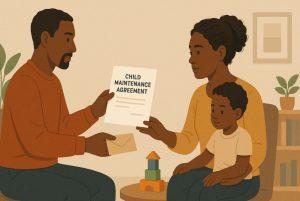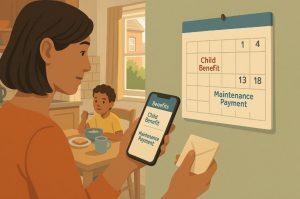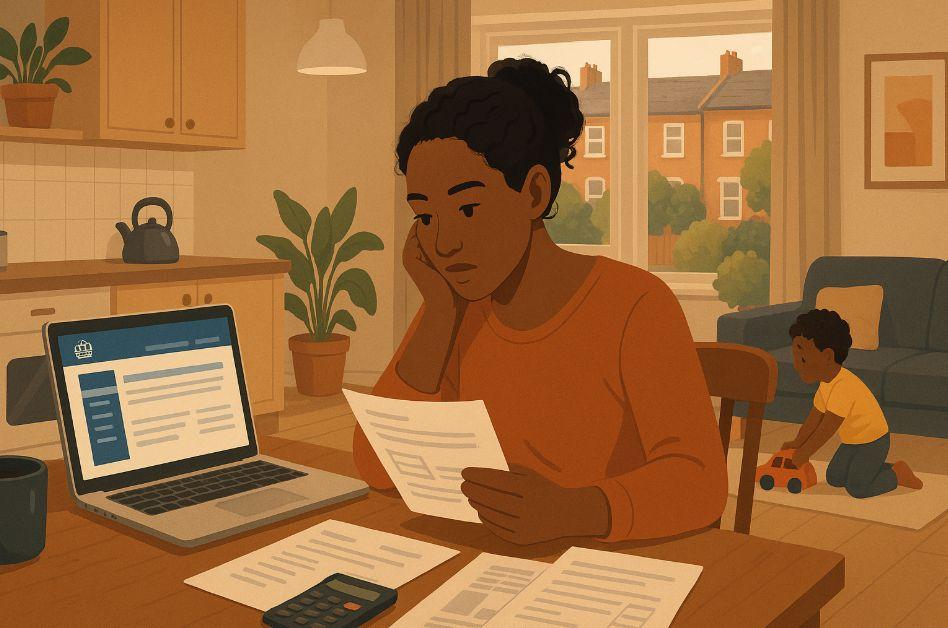Understanding how different forms of financial support interact with one another is essential for families navigating the UK benefits system. In particular, the relationship between child maintenance payments and Universal Credit can be a source of confusion for many parents especially following separation or divorce.
With new policy updates and rising living costs in 2025, it’s more important than ever to clarify whether receiving child maintenance has any impact on a household’s entitlement to Universal Credit.
This guide explores the current rules, how the Department for Work and Pensions (DWP) calculates income, and what parents across London and the UK need to know to manage their finances with confidence.
Whether you’re receiving or paying child maintenance, this article provides clear, updated insights into how these payments relate to your benefits and what support options are available if things don’t go to plan.
What Is Child Maintenance and Who Pays It?

Child maintenance is the financial support that a non-resident parent provides for the upbringing of their child following a separation or divorce. This arrangement ensures that both parents contribute to the child’s wellbeing, even if they no longer live together.
Overview of Child Maintenance Service (CMS)
The Child Maintenance Service (CMS) is the statutory body in the UK responsible for managing and enforcing child maintenance agreements. It steps in when parents are unable to reach a private agreement and calculates payments based on the non-resident parent’s gross income.
Role of the Non-Resident Parent
The non-resident parent, usually the one who doesn’t have day-to-day care of the child, is typically responsible for paying maintenance. Payments can be made privately, through CMS’s Direct Pay service, or via Collect and Pay if the paying parent is unwilling to cooperate.
Difference Between Statutory and Private Arrangements
Private arrangements are informal and agreed between both parents without CMS involvement. Statutory arrangements are enforced by CMS, often involving fees. Both options have the same purpose to provide consistent financial support for the child.
What Is Universal Credit and How Is It Calculated?
Universal Credit (UC) is a means-tested benefit that replaces six previous benefits in the UK, including Housing Benefit and Child Tax Credit. It is designed to simplify welfare and support low-income households.
Components of Universal Credit
Universal Credit comprises a standard allowance and additional elements depending on personal circumstances, such as:
- Children
- Housing costs
- Disability
- Childcare costs
Income Types That Count Toward UC
The Department for Work and Pensions (DWP) considers most forms of income when calculating UC payments, including:
- Earnings from employment or self-employment
- Savings above £6,000
- Pension income
- Certain other benefits
However, not all income affects Universal Credit and that’s where child maintenance becomes relevant.
Thresholds and Earnings in 2025
As of 2025, UC thresholds have been adjusted slightly to reflect inflation and cost of living changes. These thresholds influence how much a person can earn before their UC payments are reduced. Understanding these changes is key when assessing how child maintenance fits into the equation.
Does Child Maintenance Count as Income for Universal Credit?
This is one of the most common questions for separated or single parents receiving child maintenance. The good news is that child maintenance payments do not affect Universal Credit in most cases.
Current UK Government Policy (As of 2025)
Under UK regulations (confirmed on GOV.UK and by Citizens Advice), child maintenance payments are not counted as income when calculating Universal Credit. This includes both statutory and private arrangements. Whether the payments are made regularly or irregularly, they do not reduce or impact the amount of UC you receive.
Comparison to Other Income Types
To better understand how child maintenance compares to other income, here’s a table outlining income types and how they are treated under Universal Credit in 2025:
| Income Type | Counted in UC Calculation? | Notes |
| Child Maintenance | No | Not counted regardless of amount |
| Employment Income | Yes | After work allowance deductions |
| Child Benefit | No | Fully excluded |
| Savings (over £6,000) | Yes | £1 deduction per £250 over £6,000 |
| Pension Income | Yes | Fully counted |
| Rental Income | Yes | After allowable expenses |
| Student Loans (some types) | Partially | Depends on the type and purpose |
Impact on Universal Credit Calculation
Since child maintenance isn’t considered part of your income, it won’t reduce the amount of UC you’re entitled to. This policy provides financial stability for receiving parents, especially those managing tight household budgets.
How Does Child Maintenance Impact Single Parents on Universal Credit?

Child maintenance can significantly ease the financial burden on single parents, although it doesn’t directly affect their Universal Credit amount.
Common Concerns from Single-Parent Households
Single parents often worry that any extra income could jeopardise their benefit entitlements. However, because child maintenance is excluded from the UC calculation, parents can receive it without fear of deductions.
Budgeting and Financial Planning
While it doesn’t impact UC, maintenance can still support budgeting for:
- School supplies
- Housing costs not covered by UC
- Nutrition and clothing
- Childcare not reimbursed by UC
Support Available Through Other Benefits
In addition to UC, single parents may also be entitled to:
- Child Benefit
- Free school meals
- Council Tax Reduction
- Childcare grants (via Universal Credit)
Do You Need to Report Child Maintenance to DWP?
This is a common point of confusion, but the answer is straightforward no, you are not legally required to report child maintenance payments to the Department for Work and Pensions (DWP).
When Reporting Is Required
While maintenance doesn’t affect UC, you must report changes in:
- Living arrangements (e.g., if the paying parent moves in)
- Custody or care agreements
- Number of children in your care
What Happens If You Don’t Report
Failing to report required changes may result in:
- Overpayments
- UC sanctions
- Requirement to repay incorrect benefits
Best Practices to Avoid Overpayment or Sanctions
Always report changes in your circumstances promptly via your UC online account or through your Work Coach. Transparency ensures your payments are accurate and compliant.
Are There Exceptions Where Child Maintenance Affects Universal Credit?
Although rare, certain edge cases can lead to misunderstandings about how child maintenance is treated.
Joint Custody or Shared Care Scenarios
If custody is equally shared, neither parent may be entitled to receive maintenance, and this could affect the calculation of UC components, especially child-related elements.
Voluntary vs. Statutory Payments
Regardless of whether child maintenance is arranged privately or via CMS, it still does not affect your UC payments. However, ensure there is a paper trail for voluntary payments in case of DWP enquiries.
Complex Family Arrangements
Situations involving stepchildren, new partners, or court orders can complicate matters. It’s advisable to consult with Citizens Advice or a legal advisor in such cases.
What Are the Changes in Universal Credit Rules for 2025?

Universal Credit continues to evolve, and some notable changes in 2025 may affect families, although not specifically regarding child maintenance.
Adjustments to Thresholds or Taper Rates
From April 2025, the following changes were introduced:
- Work allowance increased by £20 per month
- Taper rate remains at 55% for most claimants
- Childcare costs reimbursed up to £1,014.63 for one child and £1,739.37 for two or more
Integration With Other Benefits
UC continues to replace legacy benefits like Child Tax Credit and Housing Benefit. This can create confusion for those receiving both UC and maintenance, particularly when transitioning from legacy systems.
How These Changes Affect Families With Child Maintenance?
Although child maintenance rules remain unchanged, the increase in UC thresholds can help families retain more earnings from work, making the overall support package more sustainable when combined with maintenance.
How Can You Maximise Your Entitlement While Receiving Child Maintenance?
It’s important to make the most of all financial resources available and while child maintenance doesn’t count towards UC, it can still be part of your broader budgeting strategy.
Using Benefit Calculators
Websites like Turn2us and Entitledto allow you to estimate your total entitlement, considering child maintenance, housing, and childcare.
Seeking Financial Advice or Local Support
Local councils and organisations like Citizens Advice offer free financial planning and debt advice services tailored to single parents and low-income families.
Legal Aid and Family Mediation Resources
When maintenance disputes arise, family mediation services can help you reach agreements without costly court cases. Legal aid may be available depending on income levels.
What Support Is Available If Child Maintenance Is Not Paid?
Even though child maintenance does not affect Universal Credit, missing or inconsistent payments can create real financial pressure. Fortunately, families have access to several support mechanisms when maintenance isn’t paid.
Enforcement actions through the Child Maintenance Service
The Child Maintenance Service (CMS) has legal authority to enforce maintenance payments if the paying parent fails to comply. The CMS can:
- Deduct money directly from the paying parent’s wages
- Withdraw funds from bank accounts
- Take court action, including fines, driving licence suspension or even imprisonment in severe cases
These enforcement actions ensure that maintenance obligations are taken seriously and pursued through appropriate legal channels.
Emergency financial help for struggling households
While CMS procedures are ongoing, families can turn to other financial support options, including:
- Discretionary Housing Payments (DHP) from local councils to help with rent
- Universal Credit Budgeting Advances for one-off or emergency expenses
- Local authority hardship funds and foodbank referrals for urgent needs
These can provide short-term relief for households impacted by missed maintenance.
Importance of keeping maintenance payment records
Maintaining accurate records of payment dates, missed payments, and any communication with the paying parent is crucial. This documentation can serve as evidence when escalating the matter to the CMS or when seeking legal remedies in court.
How Do Child Benefit and Child Maintenance Work Together?

Both Child Benefit and Child Maintenance are designed to support the cost of raising children but operate independently. Understanding their differences and how they complement each other can help maximise household income.
Child Benefit is unaffected by child maintenance payments
Child Benefit is a non-means-tested government payment given to the parent who primarily cares for the child. It is not influenced by the presence or absence of child maintenance payments, and both can be claimed simultaneously without any reduction in benefit amount.
Eligibility and payment structure for Child Benefit in 2025
In 2025, Child Benefit continues to provide a consistent level of support:
| Type of Child | Weekly Rate (2025) |
| Eldest or Only Child | £25.60 |
| Each Additional Child | £16.95 |
These payments are made every four weeks and are tax-free for households earning below £50,000 per year.
Shared care arrangements and Child Benefit entitlements
Only one person can receive Child Benefit for a child at any one time. In shared care arrangements, the benefit is awarded to the parent who provides the majority of the care. If both parents claim, HMRC will assess the living arrangements to determine the primary caregiver.
Conclusion
In 2025, the UK government’s stance remains clear child maintenance does not affect Universal Credit. Parents receiving maintenance can rest assured that it won’t reduce their benefit entitlements. With rising living costs, this policy continues to provide much-needed financial stability, especially for single-parent households.
However, understanding the broader UC rules, thresholds, and your reporting responsibilities remains vital. By staying informed, families in London and across the UK can confidently manage their finances without fear of penalties or unexpected changes.
FAQs
Is child maintenance considered unearned income for benefits?
No, child maintenance is excluded from income calculations for Universal Credit and does not count as unearned income.
Can Universal Credit be reduced if I receive maintenance?
No, Universal Credit is not reduced or affected in any way by receiving child maintenance payments.
Do both parents have to report maintenance to DWP?
No. Child maintenance does not need to be reported to the DWP for Universal Credit purposes.
What happens if child maintenance is irregular?
Even if child maintenance payments are irregular or stop, it will not impact your Universal Credit calculation, as it’s not considered income.
Does child benefit affect child maintenance or Universal Credit?
Child Benefit is separate from maintenance and also does not affect your Universal Credit entitlement.
Can I get help if child maintenance payments stop suddenly?
Yes, you can contact CMS for enforcement support or seek help from Citizens Advice for alternative financial support.
Where can I find accurate Universal Credit calculations?
Use official tools from Turn2us or Entitledto to calculate your UC based on your circumstances, including any child maintenance arrangements.









Leave feedback about this